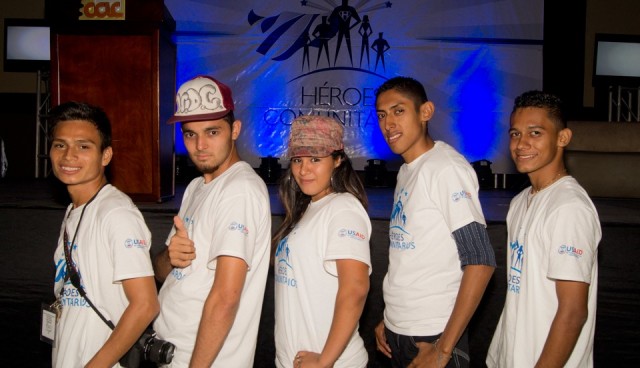[vc_row][vc_column width=”1/1″][vc_column_text]
A hero’s welcome for Honduran volunteers
By Jennifer Brookland
[/vc_column_text][/vc_column][/vc_row][vc_row][vc_column width=”2/3″][vc_column_text]

For one evening in Honduras, neighborhood volunteers were recognized as community heroes at an event that championed those who give back in some of the most challenging environments.
Three of the seven awarded for their service by U.S. Ambassador Lisa Kubiske are participants in Creative Associates International’s Alianza Joven Honduras program, which is supported by the U.S. Agency for International Development.
Alianza Joven Honduras uses grants and technical assistance to enable the government, private sector and affected communities to address violence. In Honduras, it established 44 Youth Outreach Centers where children find support, mentoring and opportunities to give back.
At the June 5 awards ceremony, Edwin Maradiaga was awarded for his volunteer work teaching children basic computer skills at one of these centers in Choloma, a community located near the city of San Pedro Sula.
“I know some things about information technology,” he said in another video about his volunteer work. “I’m going to teach the little that I know to the kids in order for them to learn a little bit more…”
At 20 years old, Maradiaga won the hero award for the youth category, which was open to volunteers aged 14 to 24 who demonstrated exceptional mentoring, motivational skills and/or artistic talent in support of regional security and development activities.
Warrior Crow, a dance troupe from San Pedro Sula and Chamelecon, performed at the event after winning the Group award, given to a collective that showed commitment to youth, communities or a specific risk factor through services, advocacy or artistic talent.
The group started at one of Alianza Joven Honduras’s Youth Outreach Centers, where member Carlos Enamorado says he started dancing because he needed something productive to do with hours of unstructured time that lead many other unsupervised youth into drugs and gangs.
“Each one of us has his cause as to how he discovered dance and what meanings come out of each person’s dance,” he said in a video produced for the Hero Awards. “It saved our lives and later helped us succeed through dance. And, thanks to God, it has helped a lot of other people also.”
Enamorado hopes his dancing shows other at-risk youth that they, too, can do something constructive.
USAID organized the award ceremony to honor people like Maradiaga and Edamorado; “unsung heroes that put in significant amount of their personal time, effort, monies and selfless commitment to the work we get paid to do in their communities.”
It also hoped that publicizing their appreciation would incentivize others to be similarly generous with their time and energy.
Besides the youth and group awards, community leaders, mentors and teachers age 25 and older were also considered. They were judged based on their leadership, advocacy and how well they raised awareness of a specific risk factor or motivated others to work toward the project goals of USAID and the Central America Regional Security Initiative.
Honduran cities are some of the most violent in the world outside of active war zones, with homicide rates orders of magnitude above epidemic levels set by the World Health Organization.
Programs like Alianza Joven Honduras emphasize community engagement as a way to involve parents, caring adult mentors and leaders in encouraging youth to avoid violence and pursue positive activities.
Nominations were accepted for volunteers in Tegucigalpa, La Ceiba, Tela, San Pedro Sula and Choloma. Awardees had to have volunteered without any compensation for at least six months.
The winners of the Hero Awards were presented with a plaque and a medal.
Reporting was contributed by Emanuel Rodriguez and Irena Zheng[/vc_column_text][/vc_column][vc_column width=”1/12″][/vc_column][vc_column width=”1/4″][vc_widget_sidebar sidebar_id=”sidebar-primary”][/vc_column][/vc_row]